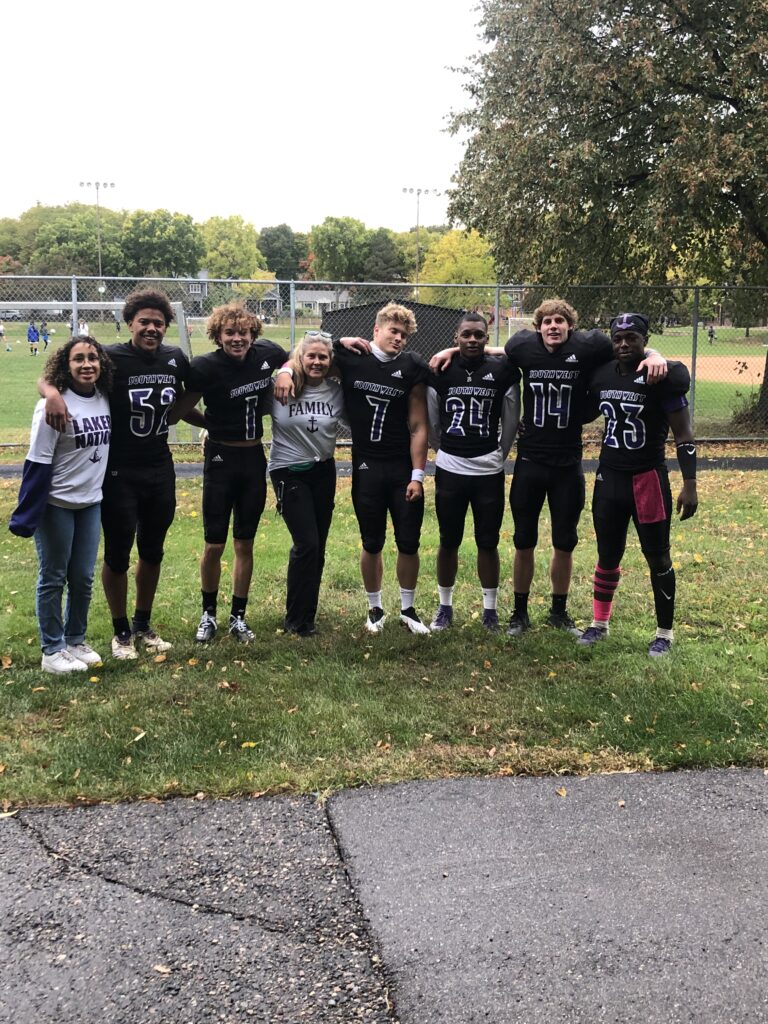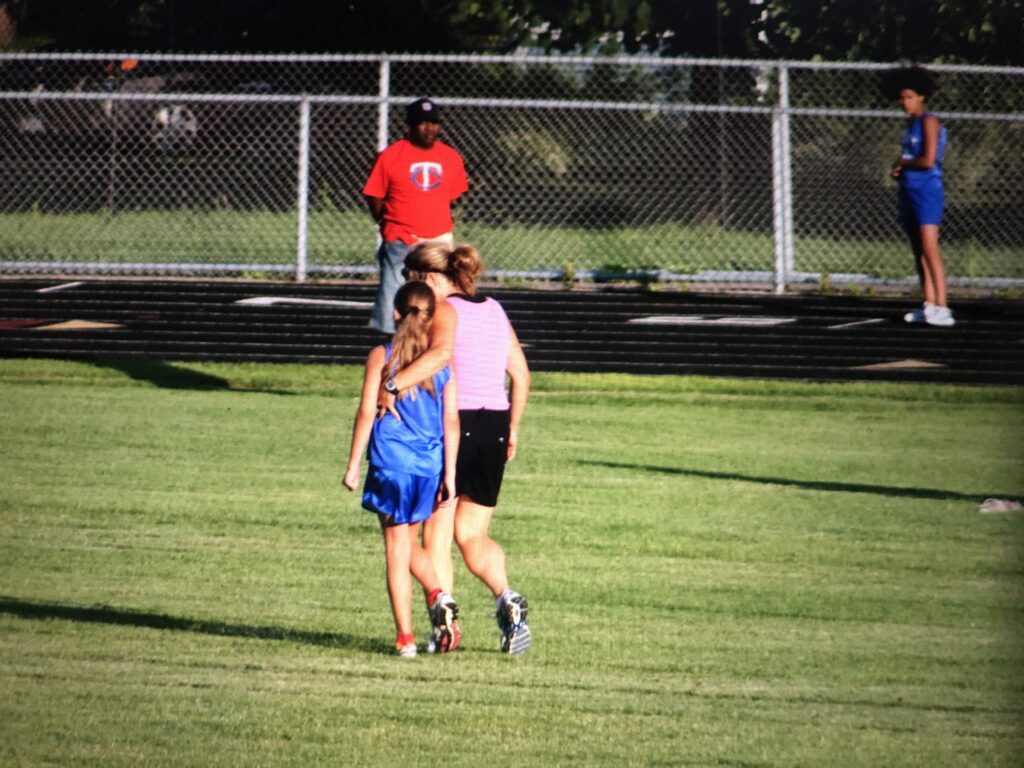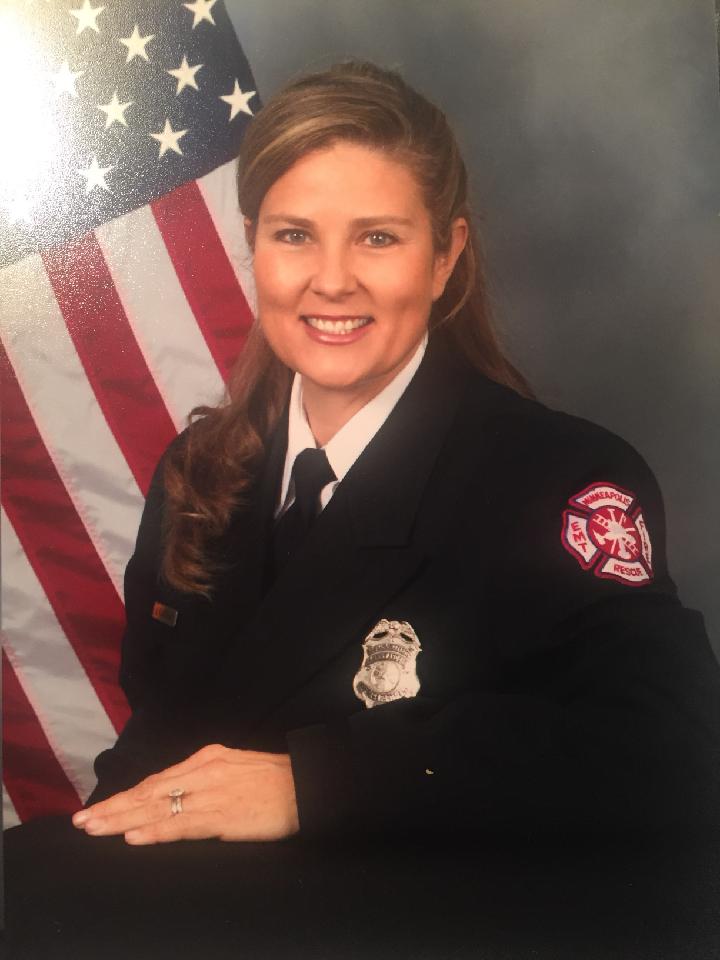Julie Flaskamp of St. Ann 645, Janesville, Minnesota, holds many titles — officially and unofficially — and she uses every opportunity they present her to exemplify the spirit of service.
“I wish you could meet her in person,” Pat Nakladal, Julie Flaskamp’s aunt, said. 2020 had its way and only allowed a phone call to Julie in December; the in-person meeting would have to wait. Pat, whose favorite qualities about Julie are her kindness and willingness to help everybody, thinks of her niece like a daughter. “From little on, my husband, Ray (who passed), and I were very closer to her!” The smile in her voice is palpable as Pat recalls taking Julie skiing as a young girl and attending her basketball games. “Ray and I never had children so Julie was our little girl,” Pat said. She and Ray, who lived in Janesville, Minnesota — an hour from Julie and her family in Minneapolis — often made the roundtrip drive propelled by excitement. When Julie’s parents moved to Chicago, their relationship with Julie deepened. “We were kind of her mom and dad,” Pat says. “We still have that close relationship!”
Pat, who recently moved to Minneapolis with Julie’s help, says, “I couldn’t ask for a more thoughtful person. She comes up with things for me to do that I wouldn’t even have asked her to do!” Pat exclaims, almost puzzled as to how Julie gets the ideas she does. “She’s a wonderful person that would do anything for you if you needed help.”

“I have been on 28 years, so I can go to a slower [fire] station where I don’t see the trauma and drama I used to,” Julie explains. Pat, still perplexed as to how Julie does so much to serve others, adds jokingly, “You have to make an appointment if you want to see her!” So how does Julie do it? She credits her work schedule: a 48-hour shift followed by four days off.
“I have the time. I choose to invest it,” Julie says. “I just moved my aunt [Pat] up here. Now we get to see her every day. I have time to do that kind of thing … and I feel I need to.”
Though she might seem like Wonder Woman (as Pat calls her) some problems continue to exist even after Julie encounters them. She started working with the football team on which her son played and came to know some of the athletes’ stories. “I’ve been able to bond with four of them who live on the northside [of Minneapolis],” she says. Combined, these four have experienced death of a parent, an incarcerated parent, the absence of one parent and witnessing a dear friend being fatally shot. “I pick up food from the food banks and drive it over [to them], I … drive them to and from practice; having them know someone cares for them makes a difference,” Julie says.
When Julie took her son on a college football visit, she brought along one of his teammates at their coach’s request. “Devon* didn’t have family with him, doesn’t have a dad, and he’s the first kid to graduate high school in his family,” Julie says. During the financial discussion, many numbers, scholarships and aid opportunities got tossed around, and Julie saw the confusion. “I asked coach to write the dollar amount [Devon] would have to pay at the end of the day,” she says. Coach passed back the paper with a “0” on it and assured him not to worry about the money. “That life has been changed,” Julie says, adding that everyone in the room was emotional. “This isn’t just an opportunity to go to college; this is life and death for these boys,” she shares.
She is accustomed to running towards a problem and even life-and-death situations. Julie, who went to school for broadcast journalism, has been a firefighter for nearly three decades. “I got out of college and didn’t realize what I wanted to do,” Julie says. “So, I went back and started classes to be a teacher.” She ended up dating a firefighter and got the idea to become one herself after seeing all that was involved in the job.
“At the middle school, there was this girl (Rachel*) who needed some help with her mom,” Pat explains. “She got to know Julie from the plays.” Julie remembers how this girl’s mother, Maria, always volunteered and did more than most parents despite speaking English as a second language and working two jobs. “She called me about two years ago,” Julie says, recalling how persistent the mother was. “She said, ‘They’re going to deport me.’” She asked Julie to write a letter explaining how much she did for the school play to support the case for her staying in the United States. “I probably got about 20 letters from people who knew Maria, and an attorney authorized them all at the school,” Julie says. The efforts paid off; Maria got a visa. Recently, Maria came down with COVID-19 and spent time in the hospital. Rachel reached out to Julie for support, and Julie stepped up with gift cards to local stores, cash and flowers. “I have so many stories like this,” Julie says with despair and a hint of hope. Pat affirms, “Julie is a person people go to because they know she will help them.”

Julie says her experience is that people don’t ask for help even if they need it. “This girl (Elizabeth*) we had two years, her mom always helped, sewing costumes, doing the cast dinner [for the musical]…,” Julie says. “She didn’t go out for the musical this time, but she was mulling around tryouts.” The adult volunteers soon learned the reason for the girl’s out-of-character behavior. “Her mom had died suddenly of a heart attack in her arms,” Julie says. This meant Elizabeth would be moving in with her dad who lived further away from the school. More miles meant no musical. Julie partnered with other parents to make sure Elizabeth could get rides to and from school for the musical. Her dad even stepped up and did the cast party. “When people see someone doing this kind of thing, it motivates them to step up a little bit,” Julie says.
Julie identifies coming from a small town as a fuel source for her kindness. “I just remember my mom, aunt, grandma … if someone dies, you have your circle. There was that real community in the small town,” she explains. “You have to find that when you go to a big city.” She drew on her parents as an example, as she saw both her mother and father volunteering in school activities. “I started volunteering [when my daughter was in kindergarten] as a brownie leader with another mom who had four kids and volunteered for everything. I just thought that’s what we were supposed to do!” Julie exclaims.
When her daughter was in fourth grade, production of the school musical ceased due to lack of director. “I stepped up with another teacher,” Julie said, a role she filled for 10 years. “Now I’m still doing it at the middle school.” One of the beautiful things about the musical is the safe place it offers for students. “You can see how you’ve helped them; you see you’ve made a difference when you didn’t even know you made one,” Julie says about staying in touch with students after they graduate.

“One of my mottos is, ‘Nobody can do everything, but everybody can do something,’” Julie says. While Pat might disagree with the first half of this and suggest we replace “Nobody” with “Julie”, this motto rings true for Julie Flaskamp: firefighter, musical director, mom, wife, niece, outstandingly kind and absolutely admirable human being. Julie concludes, “I go to sleep at night and know that I’ve done something good, I’ve done what I could to help other people.”
Article by Katlyn Pischel
*Names have been changed to protect privacy.